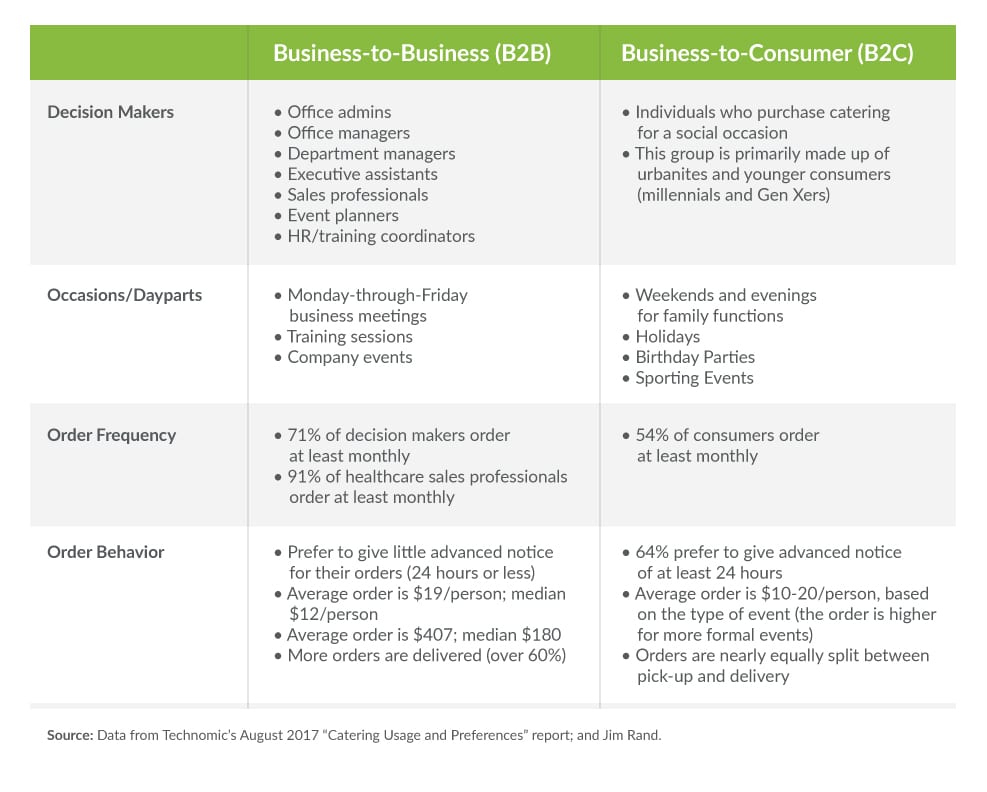This article is part of a series called “Getting Off-Premises”, which examines how to build an off-premises business.
In a previous article, “The Basics of Building a Catering Business,” we discussed the importance of understanding “Where to Play” when defining your strategy. The catering world is a large playing field. There will always be the temptation to sprint through that field, grabbing anything that you can. Rather than take a haphazard approach, you should position your business in the market strategically. Aim for the spaces—market segments—that your existing business can most effectively reach. This is critical for success. Also critical is that you ask yourself a simple but essential question as you proceed: what iscatering? And no, it’s not a trick question. However, you may find that “catering” is harder to define than you’d first assumed. The catering market is broad and complex, and a straightforward question could lend some insight. Consider the following scenarios and ask yourself, “Which of these are examples of catering?”:
- Office manager Susan orders lunch sandwich trays online from a bakery-cafe a few times a month for employee training sessions.
- A few times a year Susan calls the same bakery-cafe to pick up a couple dozen bagels and a few packages of cream cheese to bring in to the office for a breakfast meeting.
- Susan’s son is graduating from high school, and she orders chips and salsa, a buffet-style make-your-own burrito bar, and desserts from the local Mexican cantina to feed a hundred friends and relatives in her backyard.
- Over a holiday, Susan coordinates a five-course meal for a party for the board of directors through a local high-end, full-service catering company.
So, what is catering? Well, all of these examples above, and many other occasions and need-states, fit within the following broad definition of catering.
Catering is:
- Food that feeds a group of people (usually eight or more)
- Chosen and coordinated by someone not consuming the food (an admin, meeting planner, sales professional)
- Ordered in advance, typically a few hours, or up to several weeks, ahead of the event
If you understand what catering is, you will be able to tailor your menu offerings, demand driving activities, and execute operations to take advantage of the opportunity that is right for your business. Let’s dig deeper!
Types of Catering
What you should know about catering, as you proceed to build your business, is that there are two primary customer segments: business catering (B2B); and business-to-consumer catering, often called “social” catering (B2C). The table below provides a high-level comparison.

Which Catering Target Is Right for You?
Understanding what catering is, and how its customer segments differ, will help you decide which catering opportunities are best for your brand.
Given the sporadic spending habits of B2C customers—who tend to only order catering for the occasional birthday bash or big game, or rare milestone—this group is more difficult to pin down and target. B2C transactions tend to be less frequent, “one-and-done” forms of business that can’t be trusted to push your brand toward optimal success. Also, these customers prefer “shareable” food, so your menu items will need to be designed to be shared, rather than served individually. Is your menu and operating model aligned appropriately to deliver for the social occasion?

On the other hand, what you should know is that B2B customers, who order catering more regularly for the office, could send you consistent business, resulting in long-term relationship building. Know their preferences. Know their order history. Maybe even know their kids’ ages, or which sports team they root for! Tending to that relationship can pay huge dividends in the long run. Again, evaluate your business model and determine whether your brand meets their needs.
Understanding what catering is, and the catering consumer, is Step 1 along a road to building a profitable and sustainable off-premises growth platform. This initial step will help to bring out your true mettle when it comes time to execute.
Business opportunity knocks. Learn if the catering market is right for your business.







